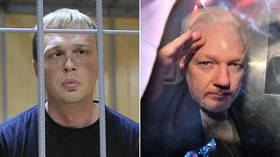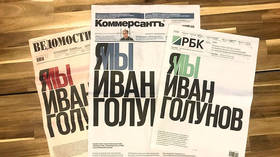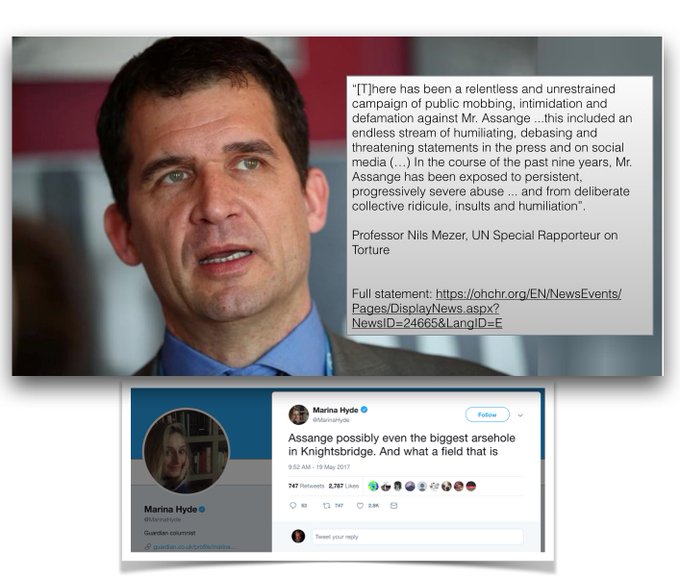Shortly after this blew up the journalist Gorbunov was released and charges dropped.
Russian media solidarity for Golunov contrasts with loathsome US/UK press bootlicking over Assange
Bryan MacDonald

RT,
10 June, 2019
If you express concern about Ivan Golunov, but not Julian Assange, yet speak of support for a free press, you are a hypocrite. And, what’s more, the reverse is also true.
Solidarity with the Russian reporter, who was arrested on flimsy drugs charges, is welcome, but not from those trying to score geopolitical points while ignoring, or facilitating, attacks on journalism at home.
Predictably, much of the US/UK media & political reaction to the arrest of Golunov has attempted to frame the episode as the Kremlin clamping down on press freedom.
However, the reality is far more complicated, and, once again, portrays the serious lack of genuine Russia expertise in the Western mainstream media.
Let’s make something clear from the outset, on a scale of 1-10 of embarrassments for the Russian government, Golunov’s detention is an eleven. The bust, on drugs charges which his peers regard as ridiculous, overshadowed SPIEF – the country’s flagship foreign investment forum.
Thus, instead of newspaper front pages documenting Chinese President Xi Jinping’s visit to St Petersburg, and delivering a PR boost for Vladimir Putin’s team, the news cycle focused on Golunov. Both at home and abroad.

Slow change
So, unless the Kremlin has some sadistic desire to sabotage its own expensive trade showcase, there’s clearly more to this case than the usual Western “Putin is an omnipotent Bond villain” narrative. And, ironically, the reality may well be far more scary than that of an authoritarian, and all powerful, government rounding up dissident voices.
Instead, it might well serve to confirm that there are elements within the state security apparatus acting with impunity. Something not entirely unique to Russia, either.
Furthermore, those interested in nuance could comprehend why change in Russia has to be gradual, given its history, and Putin (or any other leader) can’t just plough in and upend the embedded state apparatus in a day. Or, perhaps, even a few decades.
That said, alas, the usual anti-Russia choir, predictably, doesn’t want to understand. Nor does it have the knowledge, or interest, to recognize this as a potentially watershed moment.
Russia’s journalistic community has united to rally around Golunov. And the solidarity has crossed all ideological and ownership boundaries. For instance, NTV’s (a public TV network) Irada Zeynalova, strikingly, noted how “the country decided not to be an Orwellian dystopia when perestroika happened and it shouldn’t backtrack now.”
Meanwhile, Vladimir Pozner, well known in the US for his work with Phil Donahue and host of a hugely popular public TV show here, said “the detention of Ivan Golunov is a spit in the face of all Russian journalists, and I do not want spit in my face.”
Margarita Simonyan, the chief editor of RT, and also Rossiya Segonya, tweeted on Friday: “The government must answer all the public’s questions about this arrest. For the simple reason that the public has very, very, very many of them.”
She followed up on Saturday afternoon by asking for Golunov to be released to his home rather than be kept in pre-trial detention “considering his health and the general (circumstances),” while doubling-down on her insistence that the public be shown “evidence” of any wrong-doing.
Incidentally, Golunov was arrested wearing an RT t-shirt, which featured a quote from a BBC correspondent under pressure from bosses in London to find a Russian link to France’s Yellow Vest protests: “the newsroom demands blood.” As it happens, the British state broadcaster failed in its search for Russian ghosts in what is very much a homegrown movement.

‘We are Golunov’: Leading Russian papers run similar frontpage supporting charged journalist
Together they stand
On Monday, Russia’s three main “quality” daily newspapers ran the same, above the fold, front-page headline, ‘Я/Мы Иван Голунов’ (I am/we are Ivan Golunov). Obviously inspired by France’s ‘Je suis Charlie’ (I am Charlie) movement after the 2015 terrorist attack on the offices of the Parisian satirical magazine.
None of them could be described as “pro-Putin,” and they are generally critical of the state, but this was unprecedented and rubbishes the usual US/UK drivel about there being no press freedom in Russia.
To be clear, television here is largely state-owned, and controlled, and intensely pro-government, but newspapers are broadly independent and many are resolutely hostile to the Kremlin (for instance, Novaya Gazeta).
At the same time, the internet (now rivalling TV as a news source) is almost completely uncensored and numerous anti-government outlets are read widely. Including Western-backed, or controlled, sources like BBC Russian, Current Time & RFERL (US state), Deutsche Welle, France 24, the Bell and Meduza. Incidentally, the latter is Golunov’s employer.
And this brings us to the Western media reaction and comparisons with the recent arrest of another, high-profile, journalist. That of Julian Assange.

When Assange was detained on charges clearly contrived to facilitate his extradition to the US BBC boss Tony Hall was as mute as a fish. Indeed, in 2014, the British State Broadcaster created a sitcom mocking the journalist’s asylum in London’s Ecuadorian embassy, in a scheduling Hall was “delighted” to announce. Other state TV hosts, in contrast to Pozner and Zeynalova, followed Hall’s lead by keeping schtum.
Also, the leading London newspapers didn’t come together to defend Assange. Instead, the Times (owned by Donald Trump supporter, Rupert Murdoch) threw its weight behind the persecution, with only the Guardian offering some tepid support (and this largely from its former editor, who is no longer involved day-to-day) balanced with a fair amount of anti-Assange blather and tripe.
In fact, the paper’s most prominent color-writer – the dreary, repetitive, tedious, clodhopper – Marina Hyde reinforced her status as a pro-establishment yokel with years of barely-readable tirades and tweets taking borderline sadistic pleasure in Assange’s suffering and humiliation.
Two faces
Finally, we can’t forget Jeremy Hunt. Britain’s foreign secretary, and wannabe prime minister, only last week told US TV he wouldn’t block Assange’s extradition to the US. However, on Sunday, he expressed his concern for Golunov, tweeting “we are following this case closely.”
While his support for the Russian reporter would even be welcome if it were genuine, albeit something which could be regarded as meddling in the affairs of a sovereign state, it looks ridiculous given his position on the maltreatment and oppression of Assange.
Of course, he surely doesn’t even realise the glibness and hypocrisy in his words because his type don’t do refinement or moral equivalence, seeing themselves as beyond such petty inconveniences.
This writer stands with Golunov, but also with Assange. If you can’t do both, but still profess to be a journalist or a politician with fundamental ethics and principles, you might need to spend a few days staring in the mirror. Nevertheless, this advice is probably pointless as most of the buffoons and court jesters concerned would probably spend the time admiring their own reflections, rather than engaging in the soul searching required.







No comments:
Post a Comment
Note: only a member of this blog may post a comment.